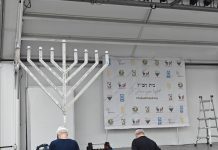Casey Stengel once described Boston Red Sox catcher Moe Berg as “the strangest man in baseball.” A product of the Newark, New Jersey school system, Berg graduated magma cum laude from Princeton University and Columbia Law School. He spoke nine languages, including German and Japanese and read ten newspapers a day. Although he spent 15 seasons in Major League baseball from 1923 to 1939 and was inducted into the National Jewish Sports Hall of Fame in 1996, Berg is better remembered as a top-secret spy who helped the U.S. win the race against Germany to build the atomic bomb.
In 1934, Berg was a last-minute selection to the All-Star baseball team that toured Japan. When the team arrived in Japan, Berg gave a “welcome speech in Japanese and also addressed the legislature.” According to the American Jewish Historical Society (Blessings of Freedom, 2002),: “Before the trip, the US government recruited Berg as a spy. While at a Tokyo hospital ostensibly visiting an American mother, who had just given birth, he snuck onto the roof and took (movie) photos of the city. Pilots reportedly later used the photos during World War II bombing raids.”
In 1943, Berg accepted a position with the Secret Intelligence Branch of the Office of Strategic Services (OSS) and assigned to the Balkan area. Being able to speak the native language, he was parachuted into Yugoslavia to evaluate the various resistance groups operating against the Nazis. His recommendations were used to determine which groups were better able to fight the Allied cause and the amount of financial support needed. Berg was then given the assignment “to help determine how close Germany was to developing an atomic research and producing atomic bomb research at two sites. Both sited were then bombed”. In a famous episode, Berg, in a disguised identify, lured the German atomic physicist, Werner Heisenberg, “to Switzerland to give a lecture on quantum theory.” It is believed that Berg had orders to assassinate Heisenberg if he heard any indication “that he was working on an atomic bomb.” Berg reported that he heard Heisenberg imply “that Germany lagged behind the United States in bomb development. Heisenberg lived, and President Roosevelt greeted Berg’s report warmly.”
Berg then spent “part of 1944 and 1945 in Germany, helping to capture several prominent German atomic scientist before the Russians got them.” After the war, according to prize-winning author Vivian Grey (Moe Berg: The Spy Behind Home Plate), Moe Berg was awarded the Metal of Freedom – America’s highest honor for a civilian in wartime. But Berg refused to accept it because he couldn’t tell people about his exploits. Berg’s sister, however, accepted the Metal. It now hangs in the Baseball Hall of Fame, in Cooperstown, New York. Moe Berg’s baseball card is the only such card on display at the CIA Headquarters in Washington, D. C. Berg lived out a quiet life in Newark, where he died at age seventy.
Sources: Barnes & Noble, “Moe Berg: The Spy Behind Home Plate,” (book by Vivian Grey): S-Self Defense Company, “The Spy Behind the Plate”: Baseball Reference, “Moe Berg”: SABR – Society for American Baseball Research, “Moe Berg”, written by Ralph Berger: Wikipedia, “Moe Berg,”: New York Times Obituary, June 1, 1972.






